   |
| Our trip began and ended at the Oakey Dokey Wine Bar. |
On our third morning, I met Rob at his hotel.
You know you look a lot like Jack Kerouac, noted
Rob.
No, more like Dean Moriarty.
I’m not sure.
He’s not that great a writer.
Better to read about the myth, than read the
novels.
There is always a story about rebel friendships taking place as we travel.
There is always a story about rebel friendships taking place as we travel.
 |
| neil and jack above, rob and bs below. I'm not sure about the resemblance. |
And so our day began. We walked out into the city,
off to the Museum of the City of Hong Kong.
The museum is located in Tsim Sha Tsui, Kowloon, Hong Kong. Just getting there is a pleasure, the metro
works so well in Hong Kong, the streets are vibrant.
Walking Rob and I continued our conversations
about the city, our lives and what global cities can be.
The exhibition only added to the conversation. At
the museum, the permanent exhibition was dubbed The Hong Kong Story. The catalog explained:
I was particularly moved by the
discussion of the Opium war, British Colonialism, and the current period. The
whole thing was patently obscene.
The final exhibit considered the modern period.
Noticeably absent was any talk of the Umbrella Movement
of 2014, when thousands of people occupied the streets of the financial
district for two and a half months demanding more democracy, free of speech,
and free elections. Tomorrow’s blog
considers this movement.
 |
| occupy-central-with-love-and-peace-hong-kong, 2014. The City Museum did not mention this bit of recent history. |
Walking around after the show, I kept on thinking
about China’s history. After China was unified, the
dominant Han Culture largely assimilated the Yue Culture, which largely
disappeared. Walking through Hong Kong one gets the feeling the same
thing may be happening with Hong Kong today.
With thousands of years of history, China plays
the long game. 150 years of colonial
rule in Hong Kong is a blip in time.
Today, more and more people from the mainland are
moving to Hong Kong, freedoms are gradually disappearing, civil liberties eroding. But a spirit and yearning remains.
Walking around, one feels thriving metropolis
full of kids lining up outside stores, discount wares, food vendors, and
vibrant streets. Pop culture is
everywhere. So is fashion. Everything is for sale.
Walking, Rob and I talked about teaching, his
class, the philosophy of faith, his journey to teach at Vassar in the fall and
the ways our lives have shifted.
My favorite novel this year has been The
Golden Notebooks, I explain to Rob, encouraging him to read it. Navigating
between totalitarian systems, it’s a useful story to consider, especially here
in China, where the communism the authors bemoan, has become a neoliberal
force.
We’d meander back to the Royal Plaza for the spa
and free buffet and back out into the streets, taking in the views of the city
from the Ritz Carlton, full of one percenters. Global capital feels everywhere,
in the cars, the people, the view of the promenade.
Lets get out of here. Back to Mongkok, we made out way to the
Oakey Dokey Wine bar, visiting our host Matthew, making new friends along the
way. I have a feeling I would be there
every night if I lived in Hong Kong.
The weekend visit is wrapping up.
Rob wants to talk. Why Herbert Marcuse he asks,
running with another piece of a conversation from hours prior. We need to discuss this.
Matthew opened a bottle of red from Northern Italy,
describing what we were drinking, joking and laughing at himself when he started
to sound pretentious.
Well, he’s my favorite philosopher, influencing
my writing and activism in countless ways. I tried to situate Marcuse’ work
within the context of German American philosophy and Frankfurt School Critical
Theory.
Everyone at Vassar read ODM, or One Dimensional Man, his tome on reification.
We read theory because it helps explain who we are, what is
happening in our moment, and what we can do moving forward.
Discussing the writings of this Frankfurt theorist who found
himself living in the San Diego sun after the carnage second world war when he
wanted socialism and got National Socialism, inspiring the generation of 1968
five decades ago, it felt entirely relevant to the moment in Hong Kong.
“Free election of masters does not abolish the
masters or the slaves” he wrote.
Sitting in Hong Kong, where the state has told its
democracy advocates that they can have free elections as long as the party identifies
the candidates, Marcuse’s thinking felt apt, the commodity expanding everywhere,
steamrolling over ideas and ambitions. “The people recognize themselves in
their commodities;” he wrote. “They find their soul in their automobile, hi-fi
set, split-level home, kitchen equipment.”
Marcuse was also a surprisingly witty man, teaching
activists and funnymen, such as Abby Hoffman, alike.
“Not every problem someone has with his girlfriend
is necessarily due to the capitalist mode of production,” he pointed out.
I was first moved by Marcuse’s thinking during that
intellectual history class all those years ago at Vassar. Even then, he pointed at the specter of agency.
Reading his Aesthetic Dimension, I
wrote about jazz and Latin American fiction as sources for freedom, and pleasure,
positing each offers means of resistance.
In it, he wrote: “Against all fetishism of the
productive forces, against the continued enslavement of individuals by the
objective conditions (which remain those of domination), art represents the
ultimate goal of all revolutions: the freedom and happiness of the
individual.”
My favorite of this works by Marcuse
is Eros and Civilization: A Philosophical
Inquiry into Freud (1955). This is
his seminal Frankfurt School text engaging philosophy and psychoanalysis.
We read a great deal of it in my seminars
with Stanley Aronowitz, I told Rob, who did not seem convinced of its
relevance.
Out of those readings of Marx and Lukacs,
I found myself digging through Reason and
Revolution, his study of Hegel.
There he writes:
“As
Hegel defines it: "Thinking is, indeed, essentially the negation of that
which is before us." ... Reason is the negation of the negative. ...
Reason, and Reason alone, contains its own corrective.”
Rob looked at me and poured another glass of wine.
I think its all becoming unhinged, I told Matthew, thanking
him for helping us out and sharing his space with us.
Its ok, take it easy, he counseled.
Rob was chatting with a new friend.
Our two and half day hang was over. Rob had to catch a plane in a few hours. And I needed to get to bed before my last day
in Hong Kong.
See you at Vassar, I told Rob, saying goodbye.
Who knows where we will be next Spring Break? Perhaps Bucharest
Romania or maybe back in Falmouth in the UK?
Its always a pleasure.


















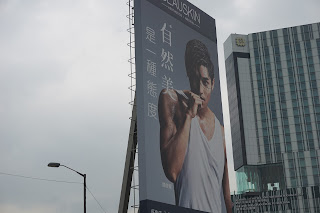
































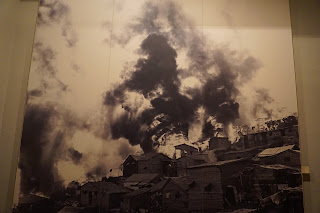


































































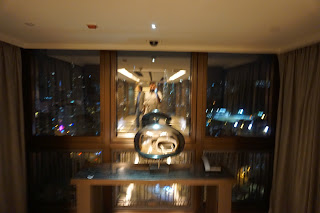












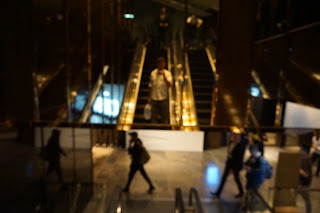











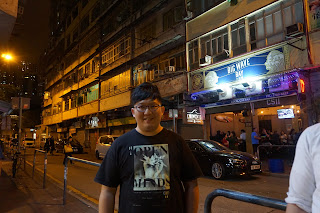
















No comments:
Post a Comment